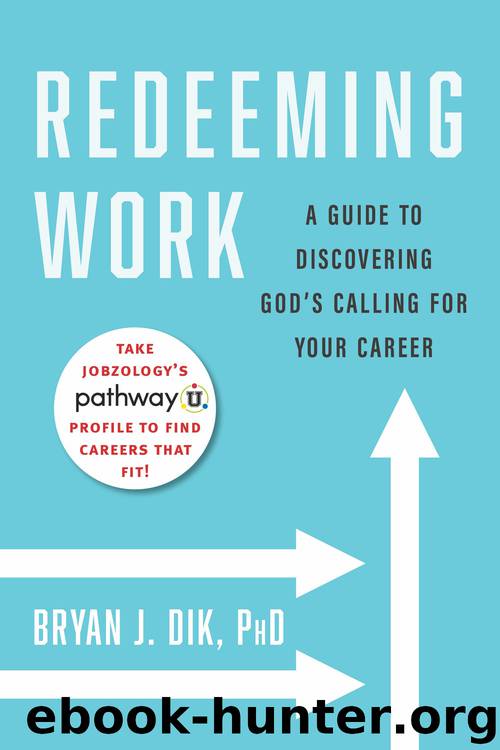Redeeming Work by Bryan J. Dik

Author:Bryan J. Dik
Language: eng
Format: epub
Publisher: Templeton Press
PART 3
Living Your Calling
CHAPTER 7
Living a Calling in a Changing World of Work
THERE WAS a time when people looking for work in countries like the United States could reasonably expect to find a job close to home and stay employed within a single organization for a long time. That employer would define its employees’ career paths over the next few decades, then gift them a gold watch and pay a pension when they retired. An implicit sweat-for-security agreement formed the basis of this arrangement, with the employee promising a consistent effort in exchange for a stable job and a well-defined corporate ladder to climb. Such jobs still exist, of course, but they are now the exception rather than the rule. A new kind of labor agreement has emerged, one in which people find themselves trading security for flexibility.
Around the same time the sweat-for-security agreement was commonplace, people also expected a familiar rhythm to their work. Most professionals could expect a short drive to an office where they would interact face-to-face every day with supervisors and coworkers. Most everyone could plan to clock in at 9 a.m. and clock out at 5 p.m. (more or less), allowing them to “leave work at work” when they returned home. Today, empowered by (mostly) seamless videoconferencing technology and ubiquitous online availability, an increasing number of workers enjoy flexible schedules and work remotely. They work more hours than people did in the past, but they have more control over their schedules—although maybe not so much when conferencing in to a meeting at 2 a.m. with a team located on the other side of the globe. Major shifts in the way people communicate, shop, build relationships, and consume content have created major disruptions in the types of jobs that people believe are needed, as well as in the types of jobs that are actually needed. More tech jobs are available, sure. But the reality is that most every job is becoming a tech job, and every company is becoming a tech company.
The increasing influence of tech obviously has a tremendous upside, with innovative new conveniences and efficiencies. Automation and artificial intelligence give us digital administrative assistants to coordinate our schedules, digital accountants to balance our books, and soon, self-driving vehicles to deliver our goods and get us where we need to go. These are wins—unless you’re the human administrative assistant, accountant, or driver being displaced. As robots become increasingly sophisticated, anxiety builds, and more and more people wonder how long it will take before they are displaced too. To fan the flame, news outlets warn of a shockingly near future in which huge swaths of the workforce are replaced by machines, ultimately leading to a world in which little human work will be needed at all.80
For better or worse, one major consequence of the accumulating change in today’s work world is that people bear more responsibility than ever for managing their own careers. In some ways, this reality might be paralyzing; it puts a lot of pressure on you, because you cannot rely on an employer to chart out a path for you to follow.
Download
This site does not store any files on its server. We only index and link to content provided by other sites. Please contact the content providers to delete copyright contents if any and email us, we'll remove relevant links or contents immediately.
The 5 Love Languages: The Secret to Love That Lasts by Gary Chapman(9815)
The Space Between by Michelle L. Teichman(6941)
Assassin’s Fate by Robin Hobb(6216)
Wiseguy by Nicholas Pileggi(5786)
Everything Happens for a Reason by Kate Bowler(4743)
Gerald's Game by Stephen King(4654)
Pillow Thoughts by Courtney Peppernell(4284)
A Simplified Life by Emily Ley(4162)
The Power of Positive Thinking by Norman Vincent Peale(4064)
Harry Potter and the Prisoner of Azkaban (Book 3) by J. K. Rowling(3360)
Resisting Happiness by Matthew Kelly(3341)
Girl, Wash Your Face by Rachel Hollis(3282)
Being Aware of Being Aware by Rupert Spira(3276)
The Secret Power of Speaking God's Word by Joyce Meyer(3220)
The Code Book by Simon Singh(3189)
More Language of Letting Go: 366 New Daily Meditations by Melody Beattie(3030)
Real Sex by Lauren F. Winner(3023)
Name Book, The: Over 10,000 Names--Their Meanings, Origins, and Spiritual Significance by Astoria Dorothy(2987)
The Holy Spirit by Billy Graham(2952)
